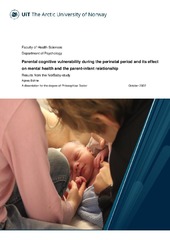Parental cognitive vulnerability during the perinatal period and its effect on mental health and the parent-infant relationship. Results from the NorBaby-study
Permanent lenke
https://hdl.handle.net/10037/28422Dato
2023-02-10Type
Doctoral thesisDoktorgradsavhandling
Forfatter
Bohne, AgnesSammendrag
The aim of the present thesis was to investigate thinking style and processing biases in expecting and new parents, and how this relates to their mental health, the parent-infant relationship, and infant development in the perinatal period. The perinatal period is one of the largest transitions in life and comes with increased risk of mental illness. Mental illness in the parents serve as a risk factor for the parent-infant relationship and infant development. To develop effectful interventions, understanding of the mechanisms that lead to illness is essential.
Infants are dependent on their caregivers for healthy development. Through interaction with their caregivers the infant develops adaptive emotion regulation, and social skills. Parental mental illness could affect parents’ sensitivity and responsiveness to infant cues, and thereby negatively affect infant development. Being caught up in negative thoughts occupies cognitive capacity, and therefore might reduce the parental emotional availability. Further, adverse childhood experiences can have a negative effect on parents’ schemas and attitudes towards infants and the parental role. Biased attention can cause parents to notice more of the infant’s negative expressions and emotionality, which further can strengthen negative thoughts and attitudes towards the infant and parental role. Patterns like this, where vulnerability in the parents affects their own health, the parent-infant relationship and infant development, were of interest in the present thesis.
The Northern Babies Longitudinal Study recruited participants in the commune of Tromso and followed them longitudinally throughout pregnancy and 7 months postnatally. Both mothers and their partners were invited to participate. There were three assessments during pregnancy, and three after birth. Participants answered a broad range of measurements, including cognitive tasks and questionnaires about their mental health, negative thoughts, adverse experiences, and sociodemographic information. After birth, the infant’s daily rhythm and regularity was observed, and signs of social withdrawal was assessed during neuropsychological screening of the infant.
Results indicate that repetitive negative thoughts serve as a vulnerability trait in parents during the perinatal period, as they predict parental depressive symptoms and stress after birth, and the parent-infant relationship. Such thoughts can be identified already during pregnancy. We did not find significant relations between other cognitive factors, attentional bias and implicit attitudes, and parental health or parent-infant relationship. Further, parity was a clear protective factor for mothers, as it was related to lower levels of depressive symptoms and parenting stress, and infant regulatory problems. Parity was also related to stronger maternal bonding. In fathers, on the other hand, parity was negatively related to bonding, and did not significantly affect fathers’ mental health or infant regularity. Probably, this can be explained by the father’s engagement and responsibility for previous children during the early months after birth. Social support from friends and family also turned out as a significant protective factor for both mothers and fathers.
The present thesis has important implications for perinatal health care services. Repetitive negative thoughts should be identified during pregnancy. Reduction of such thoughts could have a positive effect on parental mental health, as well as the parent-infant relationship. Perinatal health care services should also help facilitate social support for expecting parents, and be especially aware of the mental health of first-time parents.
Har del(er)
Paper I: Bohne, A., Høifødt, R.S., Nordahl, D., Landsem, I.P., Moe, V., Wang, C.E.A. & Pfuhl, G. (2022). The role of early adversity and cognitive vulnerability in postnatal stress and depression. Current Psychology. Also available in Munin at https://hdl.handle.net/10037/26741.
Paper II: Bohne, A., Høifødt, R.S., Nordahl, D., Landsem, I.P., Vannebo, U.T., Holstad, S.L., Moe, V., Wang, C.E.A. & Pfuhl, G. Transaction of parental cognition, stress and depressive symptoms, and infant regulatory problems. (Submitted manuscript).
Paper III: Bohne, A., Nordahl, D., Høifødt, R.S., Moe, V., Landsem, I.P., Wang, C.E.A. & Pfuhl, G. Do parental cognitions during pregnancy predict bonding after birth in a low-risk sample? (Submitted manuscript). Now published in Frontiers in Psychology, 2022, 13, 986757, available in Munin at https://hdl.handle.net/10037/28145.
Tilknyttede forskningsdata
Data for Paper I: Bohne, A. (2018). Parenting stress and postnatal depression. Dataset, Open Science Framework, https://osf.io/h8379/?view_only=b5317085db074679bbf38f1f7f639777.
Data for Paper II: Bohne, A. (2020). Sustained social withdrawal in infants: the interplay between infant temperament and parental stress and depressive symptoms. Dataset, Open Science Framework, https://osf.io/4zra9/?view_only=dd9fde22d48a47bd8ab7622a4747363a.
Data for Paper III: Bohne, A. (2021). Parental cognitions during pregnancy and bonding after birth. Dataset, Open Science Framework, https://osf.io/dw3zs/?view_only=8a4961745d294904a29ce37e527a9932.
Forlag
UiT The Arctic University of NorwayUiT Norges arktiske universitet
Metadata
Vis full innførselSamlinger
Følgende lisensfil er knyttet til denne innførselen:


 English
English norsk
norsk
